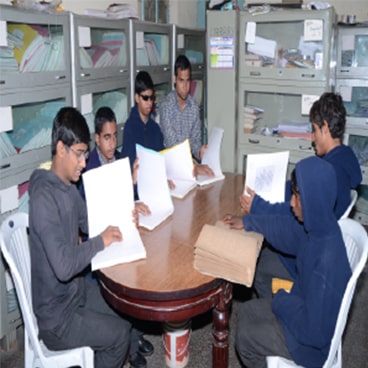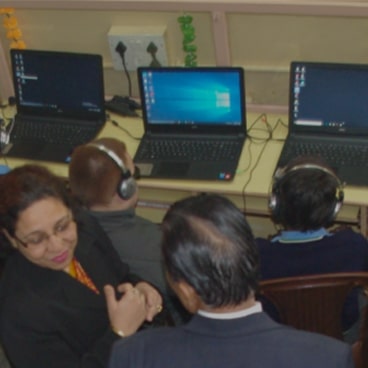About Us
The Institution for the Blind which is an oldest Institution of the country was established in 1939 at Lahore and later migrated to Delhi in 1947 at Punchkuin Road. This is the oldest Institution of the country. These facts are available in “LIMCA BOOK OF RECORDS” 2004-2005.
This is the only Institution in India who got the honor where the president of the Republic of India Dr. S. Radhakrishnan a renowned scholar became the patron in chief in 1962. In 1966 Urban and Development Minister Late Shri Meher Chand Khanna allotted land to the school at Amar Colony, Lajpat Nagar free of cost.
INTRODUCTION
The aims of the Institution are to assist the blind children with the general pattern of the society through a process of general education and by equipping them with such vocational training to enable them to gain a reasonable degree of economic independence.
OBJECTIVES
To impart educational and vocational training to the blind children. To help in the rehabilitation of children passing out of the Institution. To create awareness amongst the general public,
MISSION & VISION
The Institution nurtures an idea/mission to integrate the visually impaired into the mainstream of social life. It involves parents/professionals and persons with a missionary spirit to contribute their best to help
Introduction Mission & Vision
INTRODUCTION (ABOUT IFB)
The Institution for the Blind which is an oldest Institution of the country was established in 1939 at Lahore and later migrated to Delhi in 1947 at Punchkuin Road. This is the oldest Institution of the country. These facts are available in “LIMCA BOOK OF RECORDS” 2004-2005. This is the only Institution for the Blind in India who got the land after partition on the behest of the father of nation Mahatma Gandhi in 1947. This is the only Institution in India who got the honor where the president of the Republic of India Dr. S. Radhakrishnan a renowned scholar became the patron in chief in 1962. In 1966 Urban and Development Minister Late Shri Meher Chand Khanna allotted land to the school at Amar Colony, Lajpat Nagar free of cost. We are presently running two blind schools upto middle standard identical to other Govt./Public School as per syllabus of Govt. of NCT Delhi one at Punchquin Road and another at Lajpat Nagar catering to a total of more than 200 blind students.
We are heavily dependent on public donations for meeting the expenditure of running the schools. We provide FREE lodging, boarding, medical facilities, educational facilities and computer training etc. upto 12th standard level totally free of cost to all the students. We have a dedicated and fully qualified trained staff in our institution.
GOVERNING BODY
The Institution is presently governed by a Court-appointed Receiver Sh. C.K. Chaturvedi, Retd. District & Session Judge, to manage the affairs of the residential schools and hostels at both the school.
The Receiver has the authority of the Court to take any decision which a Management Committee is authorized to take as per the by-laws of Society including but not limited to matters relating so school/hostel and staff, discipline, payments of salaries, etc.
Meetings are held by the Receiver at regular intervals with both the vice-principals to discuss the day-to-day affairs and functioning of the institution.
OBJECTIVES
To impart educational and vocational training to blind children. To help in the rehabilitation of children passing out of the Institution. To create awareness amongst the general public, particularly the rural areas in and around Delhi, on the causes of blindness and promote its prevention. The aims of the Institution are to assist the blind population with the general pattern of the society through a process of general education and by equipping them with such vocational training to enable them to gain a reasonable degree of economic independence.
MISSION & VISION
The Institution nurtures an idea/mission to integrate the visually impaired into the mainstream of social life. It involves parents/professionals and persons with a missionary spirit to contribute their best to help them in their rehabilitation. All at the helm of affairs make earnest endeavors to provide these children the opportunities needed for self-reliance and all-around development of their personality. The Institute also aims to inspire and inculcate in them the zeal and zest for comparable quality of life through their full participation and ensuring equal opportunities.
Curriculum Overview
To impart educational and vocational training to the blind children. To help in the rehabilitation of children passing out of the Institution . To create awareness amongst the general public

Education
All modern amenities are available in both the schools. The education upto 8th standard as per the syllabus prescribed by the Education Department of Delhi Government, is given to the student.

Health
The Society also arranges eye-checkup and screening camps, twice a year with the help of Doctors from Shorff Eye Hospital, Darya Ganj and Venue Eye Hospital, Shekh Sarai, New Delhi.

Music Training
The Institution feel that music is the lifeline of the blind student where they can put their entire feeling in the various musical instruments whether its vocal or instrumental.

Computer Learning
Computer technology has proved to be a boon to visually impaired persons. With the advent of text-to-speech technology, computers have become accessible to persons with vision impairment as well.

Digital Audio Library
Persons with visual impairments cannot read the standard print. They need the reading material (text books, magazines, newspapers etc.) in alternative accessible formats like Braille, audio book, large print or accessible eBook.

Other Curriculum Activities
Since the blind children normally belongs to the very poor family as well as to the backward classes so that their family never give any attention in their childhood treating as a liability.



